English and Its Historical Development, Part 18
(Norman Invasion and Conquest by William the Conqueror)
In 1066, "William the Conqueror" and his Normans (plus mercenaries) invaded and took over Britain
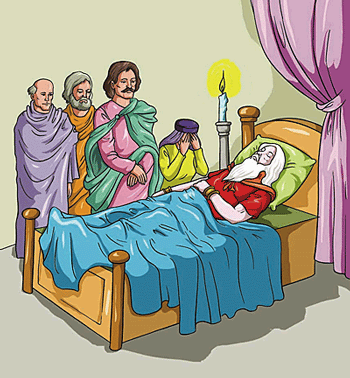
Edward the Confessor died childless in January, 1066
At his succession, Edward found England divided into a few large districts, each under the control of a powerful earl. The most influential of these nobles was Godwin, earl of the West Saxon earldom.
He had the reputation of being a shrewd, capable man and he was soon Edward's principal adviser. At the time of his death, his oldest son, Harold succeeded to his title and influence, and during the last twelve years of Edward's reign, Harold exercised a firm and capable influence over national affairs.
Harold Godwin, Earl of Wessex, was elected king by the English Witanagemot (council of citizens)
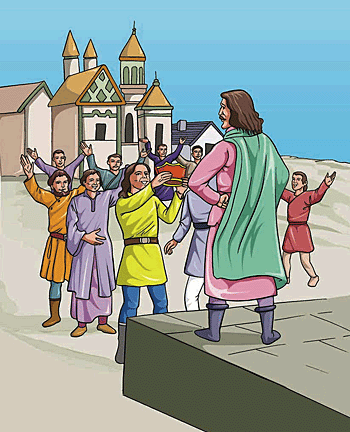
On the day following Edward's death, the English Witan (Council), weary of French favorites, elected Harold king. His election did not go unchallenged.
William, the duke of Normandy at this time, was a second cousin to the late king. While his relationship did not entitle him to any right of inheritance to the English throne, he had nevertheless been living in expectation of becoming Edward's successor.
Edward apparently at one time encouraged the aspirations of his cousin and he might have even assured him of accession to the throne of England.
Even Harold had been led, although unwillingly, to acknowledge William's claim. On one occasion, Harold had fallen into William's hands, he had, it seems, been forced to swear, as the price of his freedom, not to become a candidate or to oppose William's election.
The English had had enough of French favorites, and when the time came, Harold did not consider himself bound by his former pledge.
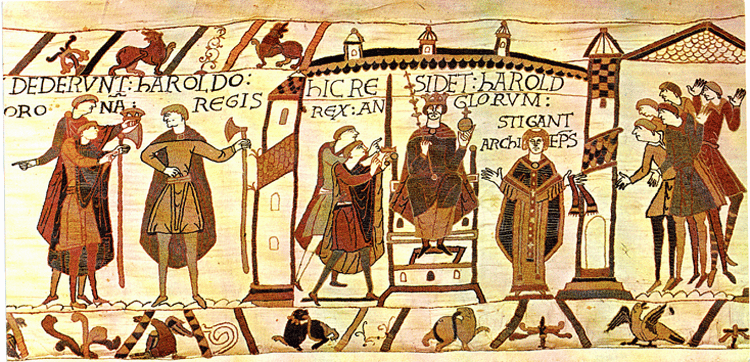
Only by force could William hope to obtain the crown to which he believed himself entitled
Probably the difficulty involved in an armed invasion of England would have discouraged a less determined claimant; however, William was considered to be an exceptionally able man.
From infancy, he had to overcome many difficulties. Handicapped by the label of illegitimacy ("William the Bastard"), the son of his father by a tanner's daughter of Falaise, he had succeeded to the dukedom of Normandy at the age of six.
There were repeated attempts on his life and only the devoted care of his regents made it possible for him to reach maturity.
After many other challenges, he emerged triumphantly from all of them. So it was, that "William the Great", as the chroniclers of the time called him, he was not the man to relinquish a kingdom without a struggle.
William, Duke of Normandy, challenged Harold's right to the throne by attacking with a fleet and an army
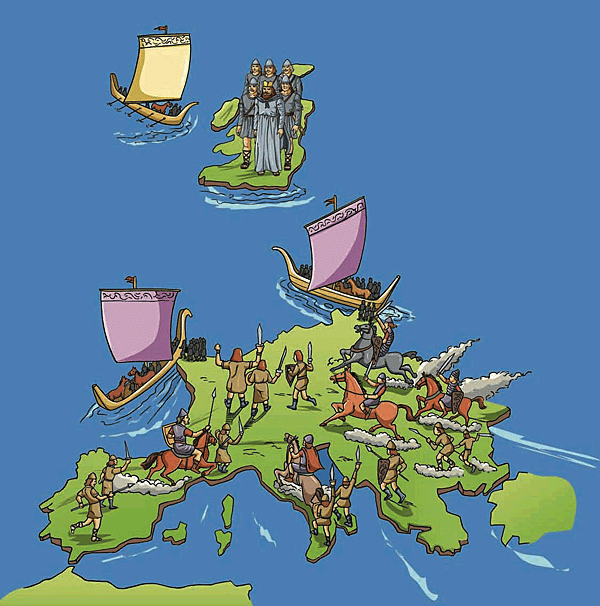
Having determined his course of action, William lost no time in beginning preparations. He secured the cooperation of his vassals with the promise of liberal rewards, once England was his to dispose of. He also came to terms with his rivals and enemies on the continent.
William even appealed to the pope for the sanction of his enterprise and received the blessings of the church. As a result of these inducements, the ambitious, the adventurous, and the greedy flocked to his banner from all over France and even other parts of Europe.
On September 28, 1066, he landed at Pevensey, on the south coast of England, with his formidable force; one third of them Normans, the others consisting of land-hungry mercenaries.
William's landing was unopposed
Harold was occupied in the north of England meeting an invasion by the king of Norway, another claimant to the throne of England, who had been joined by Tostig, a brother of Harold, who was returning from exile.
Hardly had Harold triumphed in battle over the invaders when word reached him of William's landing. The news was expected, but the English were not fully prepared for it.
It was difficult to keep a medieval army together over a long period. William's departure had been delayed, and with the coming of the harvest season, many of those whom Harold had assembled a few months before, in anticipation of an attack, had gone back home.
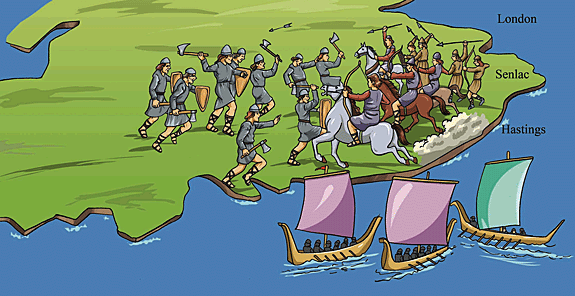
Harold was forced to meet the invading William with such forces as he had. He called for help from his brothers-in-law in the earldoms of Mercia and Northumbria to join him and to repel the foreigners with a united effort; but the earls hesitated to join Herold.
Despite the lack of support, hurrying south with his army, Harold finally reached a point between the Norman forces and London. He organized his forces on a broad hill at Senlac, not far from Hastings, and waited for William's attack.
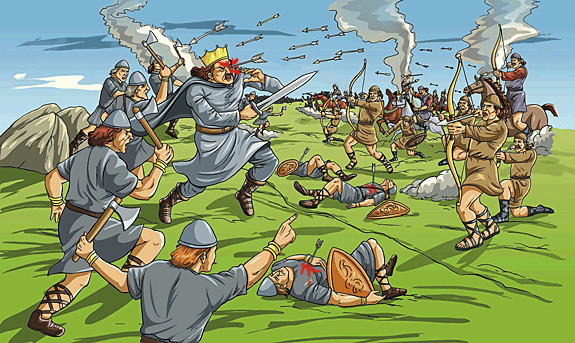
At first, the English were doing well in the battle
Harold had an advantageous position and so well did the English defend themselves that in the afternoon, they still held their ground.
For William, the situation was becoming desperate, and he resorted to a desperate stratagem. His only hope lay in getting the English out of their advantageous position on the hill. Since he could not drive them off, he determined to try to lure them off and ordered what would appear to be a retreat.
Thinking the Normans were really fleeing, a part of the English army started to pursue William's forces with the intention of cutting them down in their flight, but the Normans turned around and the battle was renewed on more even conditions.
Then the wholly unexpected happened: Harold, who was always in the thick of the fight, was pierced in the eye by a Norman arrow and his death was immediate. Two of his brothers had already been killed. Deprived of their leaders, the English became disorganized and the confusion spread throughout the troops.
The Normans were quick to take advantage of the situation, and the English were soon in full retreat. During the night, they were fleeing in all directions, seeking safety under the cover of darkness, and William was left victorious.
While William had won the battle of Hastings and eliminated Harold and his followers, he had not attained the English crown, yet. It was only after he had burnt and pillaged the southeast of England that the citizens of London decided that any more resistance would be useless. Accordingly, they capitulated, and on Christmas day, 1066, William was crowned king of England.
From 1066-1200, the Norman Conquest and the settlement of England
The Norman Conquest changed the whole course of the English language. There was a loss of the Old English word-stock and the addition of thousands of words from French and Latin.
Proceed to Part 19, Middle English Period.
INDEX or Table of Contents, English and its historical development.
References: sources of information.
